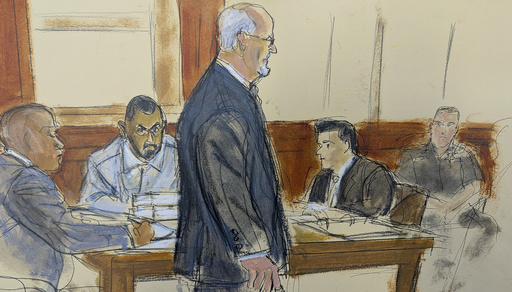MAYVILLE, N.Y. — Salman Rushdie gave a detailed and harrowing account on Tuesday of the chaotic moments during the 2022 attack when a masked assailant lunged at him on stage in western New York, assaulting him with a knife and causing severe injuries. The acclaimed author described his distressing experience while testifying on the second day of the trial against Hadi Matar, a 27-year-old who has entered a not guilty plea for attempted murder and assault related to the assault, which also resulted in injuries to another individual. This marked the first time since the stabbing incident that Rushdie was in the same location as his alleged attacker.
Rushdie recounted his immediate feelings of excruciating pain and shock, particularly recalling the overwhelming amount of blood surrounding him following the assault at the Chautauqua Institution, a center for arts and education located about 75 miles south of Buffalo, where he was scheduled to give a lecture that day. “I thought I was dying. That was my primary concern,” he stated, crediting those who restrained his attacker for saving his life.
As he narrated the events, Rushdie’s wife, Rachel Eliza Griffiths, was visibly upset, shedding tears from her seat in the courtroom. He remembered only seeing his attacker at the last moment, describing the person as dressed in black with a black face mask. “His eyes were dark and seemed ferocious,” Rushdie noted. Initially, he mistook the attacker’s slashes for punches, but then he realized he was bleeding profusely. He described the assailant using a substantial blade to repeatedly hit and slash him.
Rushdie further detailed how he was struck on his chest and torso while attempting to escape. The violence left him with severe injuries, resulting in the loss of vision in one eye. “I was extremely injured. I fell down; I could no longer stand,” he recounted. He spent 17 days hospitalized in Pennsylvania before moving to a rehabilitation center in New York City for over three weeks, where he had to relearn basic tasks like squeezing toothpaste. Last year, he shared his journey of recovery in a memoir.
In his courtroom testimony, he expressed that while he had made significant progress, his overall recovery level stood at about 75 to 80%. “I don’t possess the same energy or physical strength as before,” Rushdie remarked. Matar, seated approximately 20 feet away, often averted his gaze during Rushdie’s testimony.
The public defender, Lynn Schaffer, representing Matar, initiated the cross-examination by lightly inquiring about Rushdie’s literary career, at one point even joking about Rushdie’s cameo in the film “Bridget Jones’s Diary.” Schaffer also raised the topic of memory and trauma, hinting at a potential defense strategy. Rushdie admitted to having a false memory about the moment he spotted his attacker approaching him, as he was allegedly too stunned to move. District Attorney Jason Schmidt later outlined that Rushdie remained seated in his chair even as the assault took place.
When questioned by Schaffer about the number of times he was struck, Rushdie explained, “I wasn’t keeping count; I was otherwise engaged. But afterward, it was evident on my body.” At no point during his testimony was Rushdie asked to identify Matar as his assailant, and he declined to speak to the media as he exited the courthouse after his testimony lasted about an hour.
Prior to Rushdie’s appearance, Chautauqua County Sheriff Deputy Jason Beichner confirmed to the court that Matar was the individual he assisted in detaining backstage after the stabbing. Beichner noted that Matar appeared calm and cooperative, though his outfit was rumpled and he had blood on his hands.
This trial is anticipated to last up to two weeks, with heightened security measures in place during Rushdie’s testimony, including several law enforcement vehicles stationed outside the courthouse and security personnel positioned on the roof of the adjacent jailhouse.
District Attorney Schmidt suggested that jurors should not expect to hear about the fatwa issued by the late Iranian leader Ayatollah Ruhollah Khomeini, which called for Rushdie’s death. Following the release of Rushdie’s controversial book “The Satanic Verses” in 1989, he spent several years under protective measures after the fatwa was announced. Schmidt explained that establishing Matar’s motivations was not necessary for the state trial, as the attack was witnessed by attendees expecting to hear Rushdie’s lecture on safeguarding authors.
Matar is a dual citizen of Lebanon and the United States, born in the U.S. to parents who emigrated from southern Lebanon, an area controlled by Hezbollah. Matar’s mother has claimed that she believes her son became radicalized during a visit to Yaroun, his father’s hometown, in 2018. Following the attack, Matar, in an interview from jail, refrained from discussing whether he acted on an existing fatwa, stating, “He’s someone who attacked Islam; he attacked their beliefs.”
As Matar was led into the courtroom, he calmly proclaimed “Free Palestine” on Monday, and on Tuesday, he chanted, “From the river to the sea, Palestine will be free.” In a separate case, federal officials allege that Matar was motivated to commit the attack due to a terrorist organization’s endorsement of the fatwa from 2006. Future federal terrorism charges against Matar will be addressed in U.S. District Court in Buffalo.
